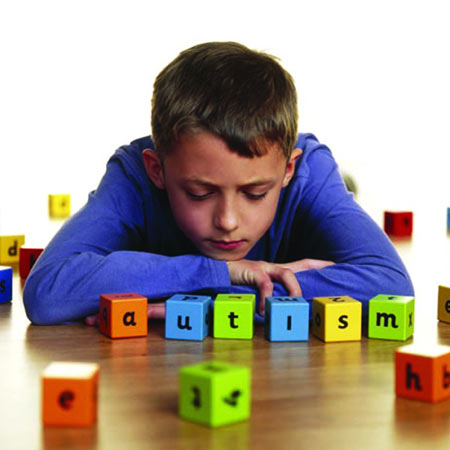當前位置: Language Tips> 合作專區> 英語學習專欄
每當在路上遇到“不正常”的孩子,心里不由得浮起一絲憐憫之情,從來都無法想象他們的生活會是什么樣子。“自閉癥”是一個感覺好遙遠的名詞。然而,那些孩子們也擁有著一方世界,可以給我們帶來一線光亮。

By Northville Shellyhelner
瑜箬 選 段會香 譯
|
“Who did you sit with at lunch today?” I asked him. “Nobody.” He responded staring down at his worn shoes. “Why?” I questioned, almost immediately after the words left his chapped lips. “No one will sit with me, but I like to be by myself, I can think easily.” “Oh.” I whispered as tears welled up[1] in my eyes. Adam, my younger brother, is very tall for his age, with brown hair, green-brown eyes, and a bright smile painted on his face. He always says “I’m not into fashion, I’m not into fashion!” whenever I scold his clothing choices. Most days you will see him wearing a worn T-shirt of a vacation spot my family has traveled to, and athletic sweat pants or faded jeans. His voice is warm and sweet, some quality makes it almost impossible to ignore. I can not tell you how much I love that kid. Everyone can remember the person in their grade that was made fun of daily. Most people even enjoy joining in on the teasing ritual[2]. Normally it is Adam who is directly or indirectly being hurt without his even knowing it, or knowing all too well that there is something wrong. He does have something wrong with him, but I would never say that is wrong or his fault. The dictionary might say that it is “a pervasive[3] developmental disorder of children characterized by impaired communication, excessive rigidity and emotional detachment[4]”, but when you live with someone who suffers and shines with autism it is a very different concept. Adam has autism, but most days I don’t even think about that. I only think of how lucky and how much I have changed by having Adam as a brother. I watch my peers every day, and I have changed. As if I see things through a different lens[5] than those around me. To say that Adam has changed my life is an understatement[6]. Adam has done so much more for me, my parents, and anyone who comes in acquaintance with him. He has taught us unconditional love and a never ending patience for others through his hardships. I have experienced a lot in my life through Adam, some days I wonder how I am able to continue. A little light warms my soul to travel on through the dark. Adam is that light for me. He is special in many more ways than one. He gives me ideas to grow off of and to build onto. Adam is my brother, my hero in life, and I love him very much. |
“你今天跟誰一起吃的午飯?”我問他。 “自己吃的,”他盯著自己腳上的舊鞋回答道。 “為什么啊?”他嘴唇干裂,話音剛落,我就立刻接著問。 “沒有人跟我坐,而且我喜歡自己一個人吃飯,便于我思考問題。” “哦,”我低聲回答,淚水盈滿了我的眼眶。 我的弟弟亞當在同齡人中身高算比較高的,他有一頭棕色頭發,綠褐色的眼睛,臉上一直都掛著燦爛的笑容,跟畫在上面一樣。每次我批評他的衣著時,他總說“我不趕時髦,我不趕時髦!”大部分時間你都可以看到他穿著帶有我們全家曾去過的度假勝地標志的舊T恤、運動褲或褪色的牛仔褲。他的聲音溫和悅耳,有一種使人幾乎不能忽視的特質。我都無法表達我有多喜愛那個孩子。 大家都能記住那個每天在班中被取笑的人。很多人也喜歡加入取笑別人的行列。通常,亞當就是那個被直接或間接傷害的人,但是他自己卻不知道,或者他只是太清楚了。他確實有問題,但我決不認為那是他的問題或錯誤。詞典上稱之為“以溝通有障礙、行為刻板重復、極端孤獨等為基本特征的兒童發育障礙性疾病”,但是當你同“自閉癥”患者一起生活時,這個概念是完全不同的。亞當有自閉癥,但我根本不會想到這些。我只是感到很幸運,因為弟弟亞當讓我改變很大。 我每天都在觀察我的同齡人,現在我已經變了,就如同我在用與他們不一樣的視角看待一切。說亞當改變了我的生活只是個含蓄的說法。亞當為我、我們的父母以及所有認識他的人做了太多。他向我們展示了什么是無條件的愛和無盡的寬容。 因為有了亞當,我在生活中經歷了許多許多。有時我納悶自己為什么還能堅持。一線光亮溫暖了我的靈魂,使我可以在黑暗的路上繼續前行。亞當就是那線光亮,他在很多方面都很特別,他讓我明白了成長的意義。亞當是我的弟弟,我生命中的英雄,我非常愛他。 (來源:英語學習雜志 編輯:中國日報網英語點津 陳丹妮) |
|
Vocabulary: 1. well up: 涌出,流出。 2. ritual: 慣例,儀式。 3. pervasive: 帶有普遍性的,遍布的。 4. detachment: 脫離,分離,冷淡。 5. lens: 鏡片,鏡頭。 6. understatement: 保守的陳述,不充分的陳述。 |
上一篇 : 《殺死一只知更鳥》第十章(節選)
下一篇 : 做或不做
關注和訂閱


電話:8610-84883645
傳真:8610-84883500
Email: languagetips@chinadaily.com.cn